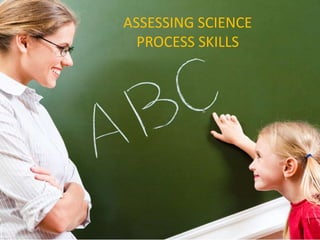
ASSESSING SCIENCE PROCESS SKILLS.pptx
- 3. Planning Planning involves (1) what to assess (2) why assess (3) how to use the assessment information (4)who will use the assessment information (5) the assessment task or activities that give students opportunities to show what they learned in an authentic way.
- 4. Strategies Assessment strategies in Science include observation, self-assessment, group or peer assessment, interviews, performance assessment, student demonstration, entries in science journals, the use of rubrics or checklists, paper-and-pencil tasks or tests, visual displays, laboratory reports, poster presentation, research report and authentic assessment.
- 5. Challenges Some forms of assessment are not feasible due to limited resources and time.
- 6. Pitfalls Pitfalls in authentic assessment include: • Failing to differentiate why you are assessing • Failing to use assessment to inform your instruction • Using assessments that only emphasize lower order thinking skills
- 7. Challenges Some forms of assessment are not feasible due to limited resources and time.
- 8. Effective characteristics of assessment are as follows: 1. Congruent and integrated with instruction 2. Based on authentic tasks and meaningful real-life contexts and science learning processes 3. Multidimensional, using many tools and methods 4. Based on what the students know, understand, and are interested in 5. Involves collaboration of students 6. Focuses on what students learned and can do 7. Is continually going on (formative)
- 9. HOW YOU WILL ASSESS WILL DEPEND ON WHAT YOU WILL ASSESS
- 10. Assessing the Science process skills There are 12 science process skills namely: *Observing *Formulating hypothesis *Classifying *Defining Operationally *Communicating *Interpreting Data *Measuring *Experimenting *Predicting *Constructing Models *Inferring *Identifying and Controlling Variable
- 11. Observing • How do we know how well a student can observe? • Be able to identify objects using more than just one sense anduse the appropriate senses • Describe the properties of the object accurately, provide both qualitative and quantitative observations and describe differences among objects that are similar
- 12. Classifying • Figure out what are the major properties that can be used to sort objects • Identify properties that are common to all the objects
- 13. Communicating • How well can a student communicate • Be able to describe an object accurately • Be able to provide a very clear descriptions so that others can identify unknown objects or events • Convey information both in verbal and written forms
- 14. Measuring • A student can measure well if they can select an appropriate type of measurement needed (how to measure a door, road, book) • Does not forget to indicate the appropriate unit of measurements • Is able to use measuring instruments and units appropriately
- 15. Predicting • How well does a student predict? • Be able to form and extend patterns of similar events • Make simple but rational predictions
- 16. Inferring • How well does a student infer? • Be able to use all information making their inferences • Avoid inventing information • Give sound reasoning in appropriate situations
- 17. Identifying and Controlling Variables • How well can a student identify and control variable? • Be able to identify factors that could affect the outcome of an investigative project • Identify which variable can they manipulate and cannot manipulate
- 18. Formulating Hypothesis • Be able to formulate a hypothesis from a given question or problem, create a hypothesis from a given question or problem • Create a hypothesis from his/her own question or problem • Explain the reason behind the creation of such hypothesis
- 19. Defining Operationally • How do you know a student can define operationally? • Be able to recognize the need to make an operational definition • Show the logical connection between the variable to be measured and its operational definition
- 20. Interpreting Data • Be able to identify what data needs to be collected • Identify how to measure this data, collect significant data • Make valid data interpretations
- 21. Experimenting • What can a student skilled in experimenting do? • Can follow directions for an experiment • Develop alternative ways of investigating a question or a problem • Perform trial and error investigation • Form valid conclusions based on data
- 22. Constructing Models • Can differentiate between a mode and the real thing • Develop an appropriate model with correct labels and interpretations
